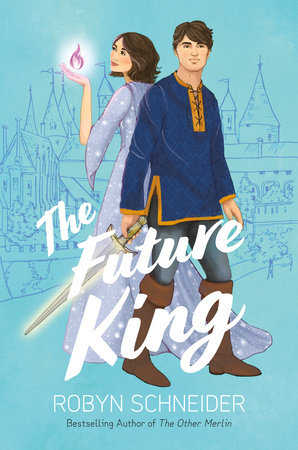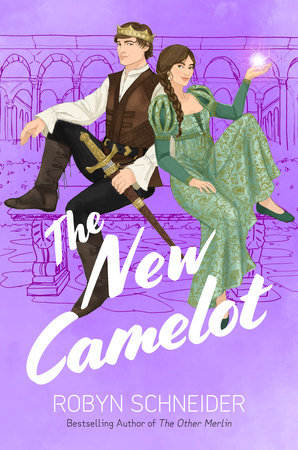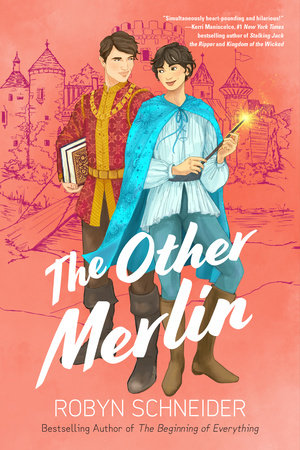
The Other Merlin
Part of: Emry Merlin
Ebook
$8.99
- Pages: 432 Pages
- Series: Emry Merlin
- Publisher: Penguin Young Readers Group
- Imprint: Viking Books for Young Readers
- ISBN: 9780593351048
An Excerpt From
The Other Merlin
Emry Merlin staggered out the back door of the theater and gulped down the warm summer air. It wasn’t much cooler outside than backstage, but at least it didn’t stink of unwashed armpits. She hunched forward, hands on her knees, willing her heart to stop pounding.
There was no reason to be nervous. She’d filled in for a missing player plenty of times before. Besides, Pell’s was a small part. A few lines, a skirmish of swords, a quick death halfway through the first act. And it was only the town theater—it wasn’t as though they were performing for their patron, the Earl of Brocelande, at his manor.
And yet, it was dangerous. There was nothing wrong with employing a girl to help with the special effects—so long as Emry stayed backstage. But the theater troupe would be in trouble if anyone discovered she was also their understudy.
At eighteen, she was tall and skinny enough to play a boy’s part, provided she flattened her chest and tucked her long black hair under a cap. Thankfully, most people assumed it was her twin brother onstage, a mistake Emmett was all too willing to encourage—especially when the mistaken party was a pretty girl.
A bead of sweat ran down her temple, and Emry wiped it away with the back of her hand. It was a scorching afternoon in June, and any sensible person would be indoors, wearing as few layers of clothing as possible.
Unfortunately, Emry wasn’t sensible.
“Smart as spades, but foolish as hearts,” her father used to say. Whenever he’d turn up, which wasn’t often, he’d give Emry a pretty ribbon for her hair and take Emmett out to the woods to learn magic. Emry found this arrangement enormously unfair, and campaigned to be included.
When Father refused, Emry made her twin teach her everything he’d learned. The next time their father had shown up, Emry had tucked her hair under a cap and switched places with her brother. Their father quickly realized he had the wrong twin, because Emry learned twice as fast.
She was included in the lessons from then on, although Father never failed to remind her that she was learning things she could never use, which was both impractical and foolish.
Emry didn’t care. She just wanted a chance to prove herself before being told no. She couldn’t help being a girl any more than she could help having magic, but she’d be damned if she sat home with a box of hair ribbons, letting boys have all the adventures.
It was the same with the theater. At sixteen, she’d bullied the property master into letting her handle their special effects. Flammable powders and pig’s blood were expensive, messy, and no longer necessary. Not if he hired her to conjure illusions of fire and blood. Even better, illusions wouldn’t need to be scrubbed out of the costumes between performances. Marion, the dresser, had insisted her father hire Emry immediately, and the two girls had become fast friends. When one of the players was struck ill, it was Marion who had pointed out that Emry would fit into his costume, and Emry who had promptly lowered her voice and reeled off his dialogue with a devilish grin.
Screw being sensible, Emry thought. Being trouble is so much more fun.
Still, she could have done without Pell’s coat, which was not only far too warm, but stunk of flop sweat.
That, at least, was something she could fix.
Emry closed her eyes and focused. Rosemary, she decided. With a hint of lemon. She didn’t have her wand, but no matter. She pictured the wretched coat, mentally issuing the command that would fix it: Extergio.
Emry gave the coat a tentative sniff. Much better. Everything was very nearly perfect—except for the play itself, which stunk even worse than the backstage.
Ronda and the Elf King. It was supposed to be a comedy, but really, the whole thing was a tragedy. Perhaps one day the troupe would have license to perform in the city, where the latest playwrights supplied better fare. But until then, the earl demanded comedy, and so long as he footed the bill, comedy he would get.
She muttered Pell’s lines, which didn’t take long, and walked through the choreography for the sword fight. She was going over the lines again when a royal messenger rode up the lane.
Knights and their squires passed through Brocelande more and more these days, and a messenger was nothing too out of the ordinary. The town was half a day’s ride from London, with a bustling market and a farrier who knew his way around a horseshoe.
The king’s messenger was sunburnt and dusty, and his horse was lathered with sweat, but his crimson livery blazed in the hot sun. The golden wyvern on his chest shone so brightly that it had to be made from the precious metal itself.
Emry stared down at her own costume, threadbare with a sloppy yellow stencil of a rising sun. It would look impressive enough onstage. The theater held its own sort of magic, which was, perhaps, why she was so drawn to it.
She glanced back at the royal messenger, expecting him to urge his horse down the hill to the inn, or up the lane to Brocelande Hall. Instead, he slowed outside the bakery, leaning down to ask a question of the baker’s boy. With only a moment’s hesitation, the boy pointed a plump and sticky finger toward the theater—no, not toward the theater, toward Emry.
Well, this isn’t good.
She pulled the brim of her cap low across her face, trying to quell her nerves as the royal messenger approached.
“Afternoon, good sir,” he called, sliding down from his horse.
Emry inclined her head in response.
“I’m looking for Master Merlin,” said the messenger.
“My father?” Emry frowned. “You’re about eight years too late.”
Seven years, ten months, and three days, actually. Father had left exactly as he always did, slipping away in the middle of the night without so much as a goodbye. Except he’d never returned. Not to Brocelande, or to Castle Camelot, or to anywhere else.
“Then it’s a good thing I’m looking for his son.” The messenger removed a scroll from his belt and held it toward Emry. “Master Emmett Merlin, His Majesty King Uther Pendragon of Camelot requires your presence at court.”
Oh no.
Emry stared at the scroll, trying not to panic. The messenger thought she was her brother! And she didn’t dare confess the truth now. Not while she stood outside the theater in a costume, for god’s sake. She couldn’t betray the performance troupe, especially to an agent of the king.
With a trembling hand, Emry reached out and accepted the parchment, bowing deeply. “Thank you, sir,” she murmured, pitching her voice low. “It’s an honor to receive a summons from the king.”
“His Majesty will expect you two days hence.” The messenger wheeled his horse around and clattered across the courtyard before Emry could say another word.
“Why would a royal messenger give this to you?” Emmett asked, frowning suspiciously at the scroll.
He was sprawled at the kitchen table, boots up, jerkin loose, and a goblet of wine at his elbow. With his black hair and pirate’s grin, he was devastatingly handsome, and what’s worse, he knew it.
“He got mixed up,” said Emry, taking down some bowls for their supper. “I was at the theater, and I didn’t look particularly, well, ladylike.”
“One day you’ll get in trouble for that.”
“Tell me something I don’t know.” Emry sighed, ladling out their stew. She passed a bowl to Gran, who was knitting by the hearth, and set theirs on the table.
“King Yurien invaded Northumbria again,” Emmett said, draining his wine goblet. “Bet you didn’t know that. Overheard it at the Prancing Stag.”
“What were you doing at the Prancing Stag?” Like she even needed to ask.
“Kissing the innkeeper’s daughters and betting at merils,” Emmett said innocently. “The usual.”
Emry shook her head. Not over her brother’s rakish ways, which she’d accepted long ago, but over the news about King Yurien. “Northumbria’s pretty far away,” she said.
“It’s not that far,” Emmett insisted. “And it’s just as before. He took control of an unfortified castle along their border and burned the neighboring village. If he goes for Cameliard next, they’ll call for Camelot to intervene.”
He swallowed a mouthful of stew and started coughing.
Emry cautiously licked her spoon, making a face.
Not again.
“Gran?” she asked. “Did you add salt to the stew?”
“Yes, dear,” Gran murmured dreamily, knitting another stitch into a long grayish thing with a glove on one end and a sock on the other. “The weather is very nice.”
“Salt,” Emry insisted. “How much?”
“All of it, from the taste,” Emmett muttered, pushing away his bowl. “If you fix the stew, I’ll tell you what King Uther wants.”
“It’s a simple spell,” Emry grumbled, reaching for her wand. “I don’t know why you refuse to learn it.”
“My father was the greatest wizard who ever lived. Why should I bother with basic household spells?”
Because they’re useful, Emry thought, unlike you.
She aimed her wand at their supper.
Abdere.
She took a cautious taste. Spicy, which tended to happen when you magicked your meal. But no longer inedible.
“Ha!” Emmett cried triumphantly, flinging the scroll to the floor. “I’m going to be knighted!”
Emry let out a sharp laugh. “I didn’t realize sarding the innkeeper’s daughter counted as a noble deed,” she retorted.
“Well, I’m practically going to be knighted,” Emmett amended, shoveling a spoonful of stew into his mouth. “Ugh. Why does magic ruin the flavor of everything? Anyway, King Uther wants me to live at the castle and train to be the next court wizard.”
Emry’s spoon clattered into her bowl. She’d imagined a handful of reasons the king had summoned her brother to Castle Camelot, but nothing like this.
“That’s—that’s wonderful,” Emry said, wishing she truly meant it.
“It’s about time Father’s legacy came in useful,” Emmett went on. “I bet half the ladies at court will take one look at me and drop to their knees.” He grinned wickedly. “Openmouthed.”
Emry blushed. “Don’t say things like that in front of Gran,” she scolded.
Or me, she almost added, even though, between Emmett’s miscreant friends and the theater troupe, she’d heard far worse.
“Well, it’s true.” Emmett shrugged. “Probably. I’ve heard Prince Arthur’s nothing special. And we all know King Uther’s bald as my arse.”
“Keep talking like that, and you’ll find yourself in the castle dungeons,” Emry warned. “Or worse, the gallows.”
“Three days,” Emmett muttered, ignoring her. He scanned the scroll again, making a face. “I should probably brush up on some magic. What’d you do with Father’s books?”
“Next to my bed,” Emry said. “Help yourself.”
Emmett yawned, leaning back in his chair. “Maybe later. The innkeeper’s daughter wore me out.”
Of course she did, thought Emry.
It was all so enormously unfair. This was why their father hadn’t wanted to teach her. Why he’d brought her dolls and ribbons and had frowned when she’d mastered spells faster than her brother. He’d known this would happen.
Their father had served at the royal court. When he was alive, kings had trembled in fear of the great kingdom of Camelot, ruled by the powerful Uther Pendragon, and protected by the formidable Wizard Merlin. And now Uther wanted to continue that legacy, with Merlin’s son standing alongside his own.
Well, good luck with him.
Emmett drained his second glass of wine and rambled on about his day, but Emry had stopped listening. All she could think was, Emmett’s going to London, to live in a castle and learn magic. And not because he’s smarter than me, or older, or more talented. Because he’s Merlin’s son, and I’m just his daughter.
More in Series









